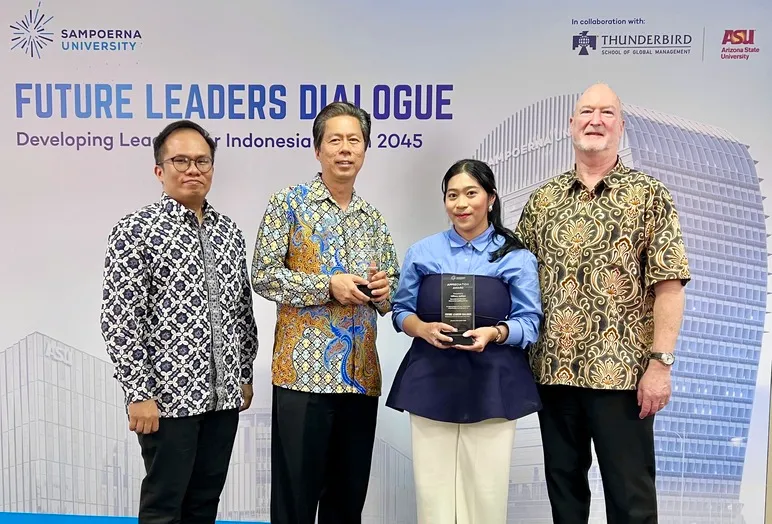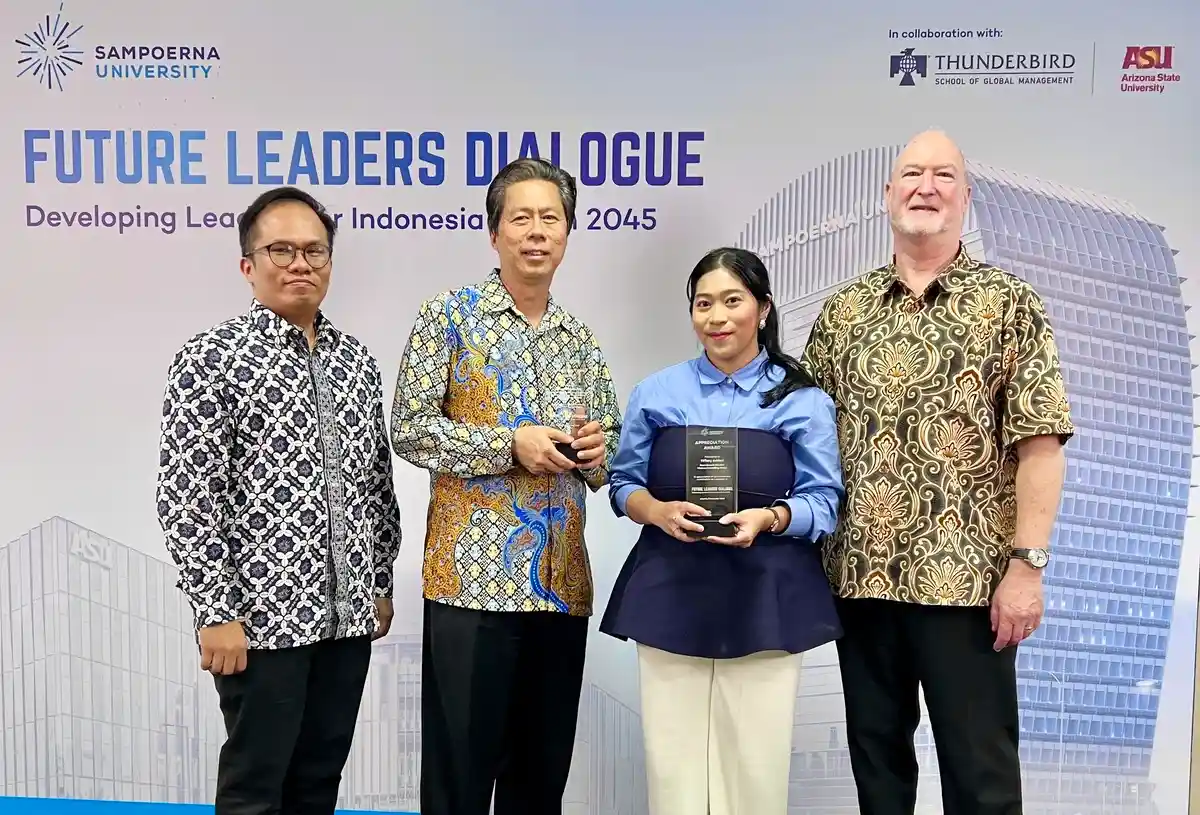
Sampoerna University reaffirms its commitment to preparing future-ready leaders capable of navigating global complexities through its Future Leaders Dialogue initiative. Carrying the theme “Developing Leaders for Indonesia Vision 2045,” this forum serves as a strategic meeting point for academics, industry practitioners, and policymakers to craft sustainable and forward-looking leadership development strategies.
International institutions such as the OECD and the World Bank project that Indonesia could become one of the world’s top five economic powers by 2045. The realities of digital transformation, shifting industry landscapes, and global economic uncertainty demand a new generation of leaders who are adaptive, globally minded, and deeply committed to sustainability. As Indonesia moves toward 2045, strategic investment in leadership and talent development becomes increasingly urgent—success will hinge on the ability of the next generation to lead transformative, innovative, and sustainable change across sectors.
“Indonesia’s projected economic rise toward 2045 presents both immense opportunity and a challenge to ensure our human capital is globally competitive," stated Pananda Pasaribu, Head of the MBA Program at Sampoerna University. As an educational institution, Sampoerna University bridges the gap between academia and industry needs. Through our collaboration with Thunderbird School of Global Management at Arizona State University, we offer a Master’s program designed to equip professionals with the capabilities to navigate global challenges and contribute to Indonesia’s sustainable economic growth.
”A lifelong learning mindset and a commitment to continuous personal development, he added, are essential qualities for future leaders—echoing the priorities of industry professionals who must constantly adapt, broaden multidisciplinary perspectives, and build new competencies in line with global business dynamics.
Susanto Samsudin, Senior Director Business Unit Indonesia & South East Asia+ for Orbia Building and Infrastructure, Wavin, emphasised that amid rapid technological disruption, openness and continuous learning are indispensable.
“As a Thunderbird alumnus, my global experience taught me that effective leadership comes from building bridges—across disciplines and cultures. This enables us to embrace new perspectives, respect differences, and ultimately make smarter, more inclusive decisions. Persuasive communication, data-driven thinking, and the humility to seek new experiences are fundamental. True leadership is about preparing and empowering others for the future,” he uttered.
The dialogue also highlighted the importance of investing in self-development and workforce capacity-building through advanced education—an essential strategy to remain competitive amid today’s global economic slowdown and to unlock Indonesia’s full economic potential ahead of 2045.
Tiffany Adriani, Recruitment Director at Monroe Consulting Group, noted that nearly 39 per cent of core job skills are expected to shift by 2030, with emphasis on agility, sustainability, and technological literacy.
“Future leaders must guide organisations through continuous change and reskill more than half of the global workforce. Technology should be viewed as an enabler, while humans remain the primary decision-makers—turning role disruptions into opportunities,” she added.
She also shared practical tips for professionals seeking to upskill or reskill:
1. Adopt systemic and sustainable thinking
Beyond digital literacy, seek programs that examine business impact holistically (economically, socially, and environmentally), especially for those targeting strategic or managerial roles.
2. Embrace a growth mindset
Cultivate lifelong learning through relevant courses, new projects, or company-provided development programs.
3. Give and seek mentorship
Share expertise with junior colleagues while also learning from younger professionals skilled in emerging areas, ensuring capability alignment across all career levels.
4. Prioritise soft skills
Focus on interpersonal capabilities (empathy, collaboration, and communication), as well as ethical, strategic leadership. These irreplaceable skills are key differentiators for upward career mobility.
5. Pursue advanced education
While many professionals pursue a Master’s degree, today it is valued less as a requirement and more as evidence of ambition, readiness for higher leadership roles, and strategic thinking. A Master’s degree offers structured frameworks, scaling and transformation capabilities, and access to a robust professional network that experience alone cannot always provide.
The Future Leaders Dialogue gathered dozens of participants from national and multinational companies. Beyond cross-sector idea exchange, the event also introduced Sampoerna University’s flagship programmes, including special incentives for applicants to the 2026/2027 Master’s intake—ranging from registration fee reductions of up to Rp50 million to zero per cent instalment plans, enabling professionals to continue their studies without compromising flexibility.
Through its collaboration with Thunderbird School of Global Management, Sampoerna University presents a unique dual-degree program, allowing students to earn both a Master of Business Administration (MBA) from Sampoerna University and a Master of Leadership and Management (MLM) from Thunderbird. This programme blends top-tier educational standards from the United States and Indonesia, with a focus on leadership development, business digitalisation, and ESG (Environmental, Social, and Governance) principles—shaping academically excellent, adaptable, and globally competitive professionals.
This approach underscores Sampoerna University’s commitment not only to academic rigor but also to cultivating ethical, sustainability-driven leadership mindsets. Through industry-relevant learning experiences, students gain a holistic understanding of the interconnections between technological innovation, social responsibility, and sustainable business practices.
Ariwan Panigoro, President Commissioner of PT Starway Engineering Indonesia and current Master’s student at Sampoerna University, shared, “In the fast-moving global business landscape, I felt the need to ‘refill’ my intellectual tank and gain fresh perspectives. I chose Sampoerna University’s Master’s program because it aligns with my career stage and inspires lifelong learning within my family and community. The structured thinking frameworks sharpen my strategic and analytical capabilities—directly enhancing my decision-making at the commissioner level.”
His experience reflects the critical importance of collaboration between industry and academic institutions to shape leaders prepared for the complexities of the future. Such synergy ensures contextual, relevant learning that responds to the evolving realities of the workforce while strengthening a future-oriented education ecosystem.




 Mirella Pandjaitan
Mirella Pandjaitan
 Nov 14, 2025
Nov 14, 2025






